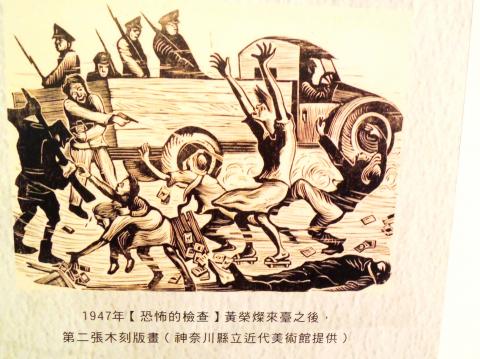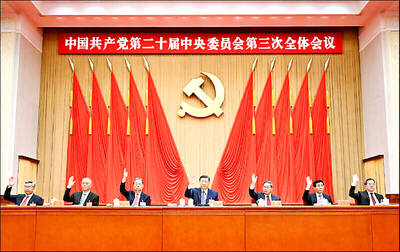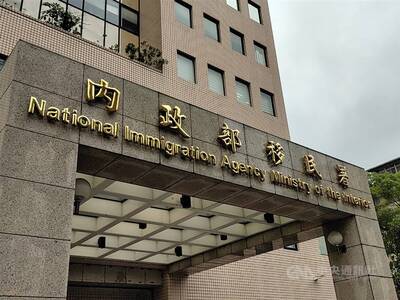An exhibition featuring Chinese wood engravings depicting artistic representations of Taiwan around the time of the 228 Incident is currently on display in Greater Tainan.
The exhibition presents artworks by Chinese expatriates who lived in Taiwan between 1945 and 1949, the years when Taiwan experienced a turbulent shift from Japanese colonial rule to the Chinese Nationalist Party (KMT) regime, the 228 Memorial Foundation said.
The 228 Incident, which began on Feb. 27, 1947, refers to an uprising against the then-Chinese Nationalist Party (KMT) administration, which led to the murder of thousands of civilians, and nearly four decades of martial law in Taiwan.

Photo: Tsai Wen-chu, Taipei Times
According to the foundation, the Chinese artists engraved Taiwan’s landscape against the background of contemporary society under the then-KMT regime.
Among them was Huang Rongcan (黃榮燦), an artist from Chongqing in China’s Sichuan Province.
An editor at a newspaper in Taiwan when the 228 Incident took place, Huang subsequently carved Horrifying Inspection (恐怖的檢查) in secret based on what he had heard from his colleagues, the foundation said.
Published in the Shanghai-based Wenhui Daily newspaper two months later, the piece became an iconic symbol of the massacre.
As the Chinese Civil War between the KMT and the Chinese Communist Party in China escalated, the political climate within Taiwan became increasingly volatile, prompting the artists to return to China, the foundation said, adding that since the KMT regime retreated to Taiwan and purged the island of “communist activities,” Taiwan has not seen any uncensored wood engraving since 1951.
The curator, Hung Wei-chien Studio, hunted through numerous collectors’ galleries to rediscover the precious artworks, whose artistic value is as significant as their visual documentation of the 228 Incident, the foundation said.
In addition to Huang’s engravings, the exhibition showcases nearly 100 artworks, including that of Zhu Minggang (朱鳴岡), Huang Yan, Wang Maigan (王麥桿), Huang Yongyu (黃永玉), Qiu Ling (邱陵), Wang Renfeng (汪刃鋒), Wu Zhonghan (吳忠翰), Zhang Xiya and Mai Fei (麥非).
The foundation said the exhibition had its opening at the National 228 Museum in Taipei last year, and was then held in Taitung, Hualien and Pingtung counties.
Its Tainan tour began on Saturday and is scheduled to run through Feb. 8.

TECH SECTOR: Nvidia Corp also announced its intent to build an overseas headquarters in Taiwan, with Taipei and New Taipei City each attempting to woo the US chipmaker The US-based Super Micro Computer Inc and Taiwan’s Guo Rui on Wednesday announced a joint venture to build a computation center powered only by renewable energy. After meeting with Supermicro founder Charles Liang (梁見後) and Guo Rui chairman Lin Po-wen (林博文), Premier Cho Jung-tai (卓榮泰) instructed a cross-ministry panel to be established to help promote the government’s green energy policies and facilitate efforts to obtain land for the generation of green power, Executive Yuan spokesperson Michelle Lee (李慧芝) said. Cho thanked Liang for his company’s support of the government’s 2019 Action Plan for Welcoming Overseas Taiwanese Businesses to Return to Invest in

The unification of China and Taiwan is “non-negotiable,” China’s Taiwan Affairs Office (TAO) said yesterday in response to an article by a Chinese academic suggesting that Beijing would not set a timetable for the annexation of Taiwan in the next four years. Chinese international studies researcher Yan Xuetong (閻學通) at Beijing’s Tsinghua University wrote in an article published last week in Foreign Affairs that China’s focus for the next four years would be revitalizing the economy, not preparing a timetable to invade Taiwan. The TAO said that was only the personal opinion of an academic. The Chinese Communist Party has since 1949 committed

China is likely to focus on its economy over the next four years and not set a timetable for attempting to annex Taiwan, a researcher at Beijing’s Tsinghua University wrote in an article published in Foreign Affairs magazine on Friday. In the article titled “Why China isn’t scared of Trump: US-Chinese tensions may rise, but his isolationism will help Beijing,” Chinese international studies researcher Yan Xuetong (閻學通) wrote that the US and China are unlikely to go to war over Taiwan in the next four years under US president-elect Donald Trump. While economic and military tensions between the US and China would

The National Immigration Agency (NIA) said Thursday it had caught 124 people attempting to use forged documents to visit Taiwan since allowing Chinese nationals based overseas to apply for entry permits in September last year. The NIA’s revelation comes after unnamed immigration officials and travel agency workers cited in a CNA report Wednesday said that Chinese entry permit applicants had submitted forged documents showing they were students in Malaysia. After closing its borders to Chinese tourists on Jan. 22, 2020 amid the COVID-19 pandemic, Taiwan began allowing those living or studying outside of China to enter from a third country on Sept.